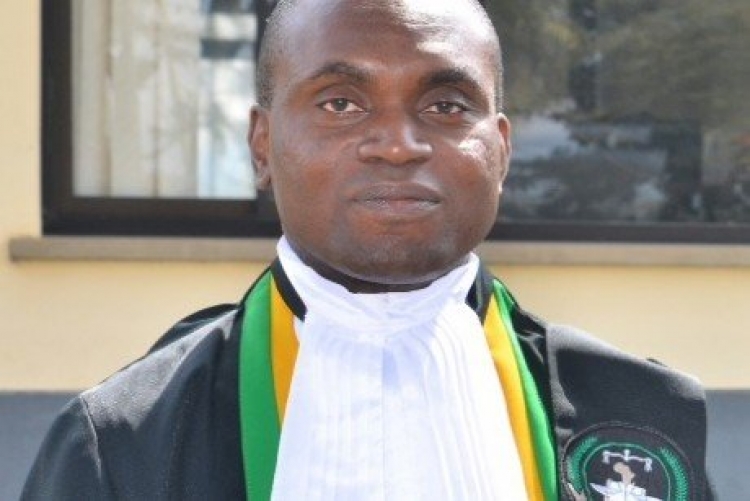By Peter Olorunnisomo – The sensitivity of Africa to enter a new age of development, growth and justice is gradually becoming a reality. Reports of the policy and development thrust for economic growth in Africa has witnessed tidal resurgence that promises not to abate in the last few years.

And as the phrase ‘parri passu’ would imply, the need for social security enhanced a justice system across boundaries is accompanying newly defined relationships that prospects greater and closer relationships within the African continent and a very viable threat to the pre-independent era of apron-strings maternities.
The African Court on Human and Peoples’ Rights (AfCHPR), established by virtue of Article 1 of the Protocol to the African Charter on Human and Peoples’ Rights on the Establishment of an African Court on Human and Peoples’ Rights, to complement the protective mandate of the African Commission on Human and Peoples’ Rights, with a view to enhancing the protection of human rights on the continent, has initiated public hearings on three applications lodged before the court.
In the first application, a Ghanaian Alfred Wayome is seeking redress from Ghana Government. He alleges to have provided engineering financial services to the respondent state, pursuant to an agreement for securing funds for the rehabilitation of the Accra and Kumasi Sports Stadia for the Confederation of the African Cup of Nations Tournament of 2008.
The Applicant alleges that, by not respecting the terms of the agreement, the respondent state violated the rights provided under the Charter. Mr Wayome alleges that the government wants to take over his properties after he refused to return some funds he was paid after he had won the tender.
In another matter, Mr Sebastian Ajavon alleges that Benin has violated his rights by withdrawing his customs license and disrupted his radio and television stations’ signals.
The applicant is also alleging that the proceedings instituted against him by the Public Prosecutor and the Benin Customs Services in the cocaine trafficking case was not fair. The third application is between Mr Armand Guehi and the United Republic of Tanzania.
Mr Guehi, an Ivorian national, who has been convicted and sentenced to death for murdering his wife, is challenging the conviction on the ground that it violated his right to a fair trial.
By mid-July 2017, the Court had received 147 Applications, disposed of 31 while 112 pending and transferred 4 to the Banjul Commission. Of the 147 Applications received, 134 were from individuals, 10 from NGOs and 3 from the Banjul Commission.
The Court received 12 requests for advisory opinions of which 5 are pending while 7 have been finalized. 3 requests for review all of which have been finalized and 3 requests for interpretation of judgment 1 of which has been finalized while 2 are pending.
The statistics may not sufficiently address and reflect the need for the Court in Africa and the human rights needs in a continent that urgently requires addressing human rights abuses attributable to political and cultural importunities.
In response to this, the African Court on Human and Peoples’ Rights (AfCHPR) has begun sensitisation missions which started with the Sahrawi Arab Democratic Republic (SADR) from 5 to 7 February, 2018. This is part of the on-going efforts of the Court to interact with different stakeholders in order to deepen their understanding of the Court’s mission and importance and to encourage States to ratify the Protocol establishing the AfCHPR and deposit the declaration under Article 34(6), which allows direct access to the Court by NGOs and individuals.
The main objective of that visit was to encourage SADR, which has already ratified the Protocol, to deposit the declaration required under Article 34(6) of the Protocol.
So far, 30 out of 55 African Union (AU) Member States have ratified the Protocol and only 8 of them have deposited the declaration recognising the competence of the Court to receive cases from NGOs and individuals. These 8 States are: Benin, Burkina Faso, Côte d’Ivoire, Ghana, Malawi, Mali, Tanzania and Tunisia.
The President of the AfCHPR, Hon Justice Sylvain Oré, during that three-day mission, welcomed the SADR’s invitation to conduct the sensitisation, adding that it was a step in the right direction.
“For the Court to achieve its objectives and further strengthen African human rights systems, a greater number of countries must ratify the Protocol and make the declaration under Article 34(6),” he stressed.
About forty lawyers were initially registered with the African Court on Human and Peoples’ Rights (AfCHPR) to represent indigent Applicants before the Court and were trained in Arusha
Currently 61 counsels from 25 countries have registered with the Court to represent indigent Applicants.
The countries are: Algeria, Benin, Burundi, Cameroon, Congo (DRC), Dutch / French, Egypt, Gabon, Gambia, Italy, Kenya, Liberia, Mali, Mauritania, Nigeria, Rwanda, Senegal, South Africa, Tanzania, Togo, Uganda, United Kingdom, United States, Zambia, Zimbabwe and Tunisia
To date the Court has issued 8 judgments on merits, in which it has found States Parties in violation of various articles of the African Charter on Human and Peoples’ Rights (the African Charter). It has also issued judgments/ rulings on reparations and issued orders for provisional measures in at least 20 cases. 3 requests for Review have been received and all 3 finalized while 3 were received on interpretation of judgment with 1 finalized and 2 pending.
Kindly follow us on twitter:@AfricanVoice2









